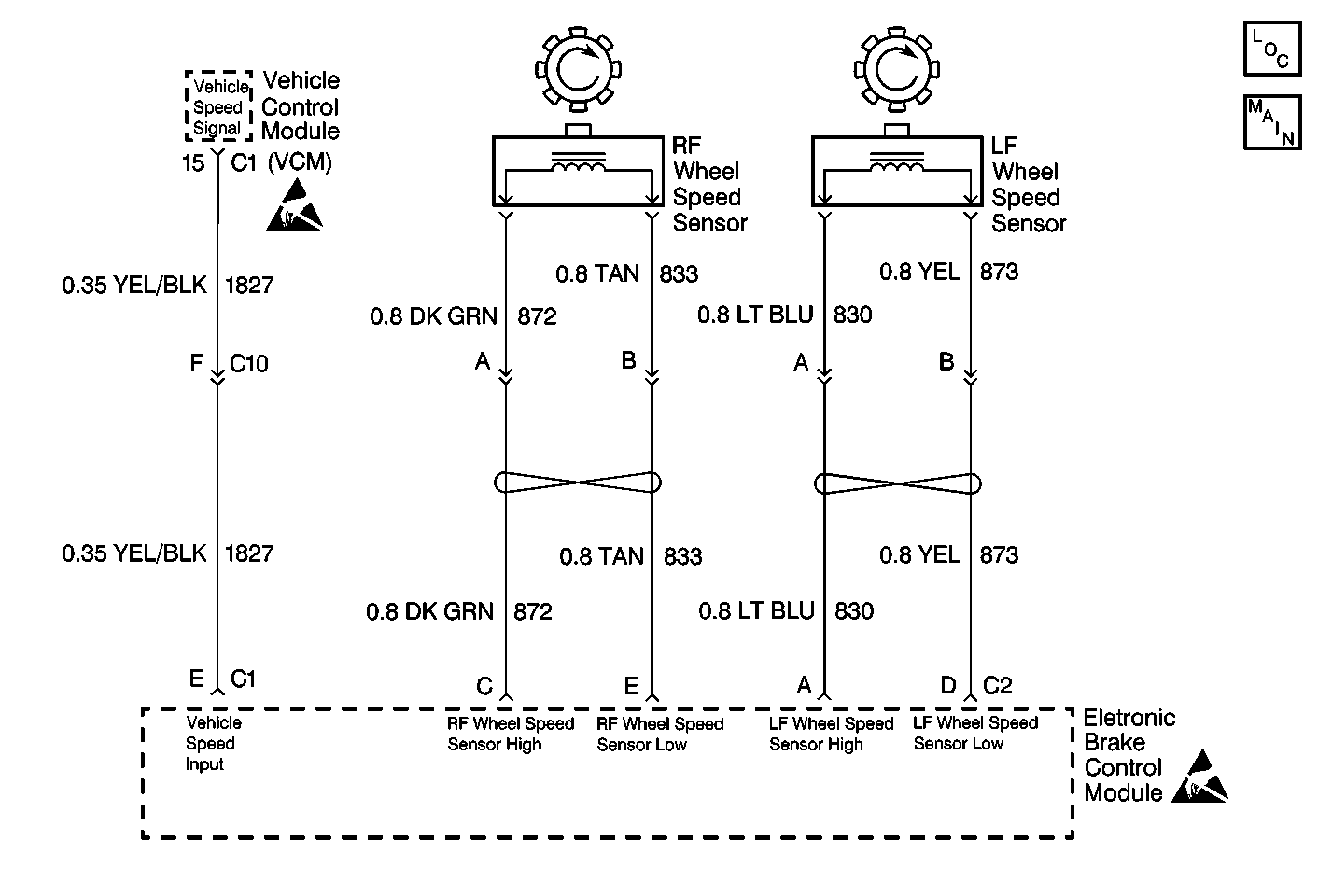
Circuit Description
The wheel speed sensor coil emits an electromagnetic field. A toothed ring on the wheel passes by the wheel speed sensor and disrupts its electromagnetic field. The disruption in the field causes the wheel speed sensor to produce a sinusoidal (AC) voltage signal. The frequency and amplitude of the sinusoidal (AC) voltage signal are proportional to the speed of the wheel. The amplitude of the wheel speed signal is also directly related to the distance between the wheel speed sensor coil and the toothed ring. This distance is referred to as the air gap.
Conditions for Setting the DTC
EBCM losing both front wheel speed signals when the vehicle is at speeds over 19 km/h (12 mph) (brake released), or 32 km/h (20 mph) (brake applied).
Action Taken When the DTC Sets
| • | The ABS indicator lamp turns on |
| • | The ABS disables |
DTC C0229 is a Condition Latched DTC, which indicates that the above actions remain true only as long as the condition persists.
DTC C0229 is a DRP Critical DTC, which means that DRP is disabled and the BRAKE indicator lamp will also light.
Conditions for Clearing the DTC
| • | Repair the conditions responsible for setting the DTC. |
| • | Use the Scan Tool Clear DTCs function. |
| • | A Condition Latched DTC may exist momentarily, or constantly. In either case, the DTC will be stored in the EBCM memory until it is repaired, and/or the DTC is cleared. After the DTC is repaired and/or cleared and the ignition is turned to ON, the ABS lamp will remain lit until the EBCM completes a power-up self test. This test concludes when the vehicle has reached a speed of greater than 13 km/h (8 mph) and the wheel speed inputs have been checked by the EBCM. |
Diagnostic Aids
Any of the following conditions may cause an intermittent malfunction:
| • | A poor connection |
| • | Wire insulation that is rubbed through |
| • | A wire breaks inside the insulation |
Thoroughly check any circuitry that is suspected of causing the intermittent complaint for the following conditions:
| • | Backed out terminals |
| • | Improper mating |
| • | Broken locks |
| • | Improperly formed or damaged terminals |
| • | Poor terminal to wiring connections |
| • | Physical damage to the wiring harness |
When inspecting a wheel speed sensor, inspect the sensor terminals and the harness connector for corrosion. If evidence of corrosion exists, then replace the wheel speed sensor. Refer to Wheel Speed Sensor Replacement
Test Description
The numbers below refer to the numbers on the diagnostic chart.
Step | Action | Value(s) | Yes | No |
|---|---|---|---|---|
1 | Was the Diagnostic System Check performed? | -- | Go to Step 2 | |
Is the harness OK and are all the connections clean and tight? | -- | Go to Step 3 | Go to Step 4 | |
3 |
Did the DTC set? | -- | Go to Step 5 | Go to Step 6 |
4 | Make necessary repairs to the 4-way EBCM harness connector. Refer to Connector Repairs . Is the repair complete? | -- | -- | |
5 | Replace the EBCM. Refer to Electronic Brake Control Module Replacement . Is the repair complete? | -- | -- | |
6 | Malfunction is intermittent. Inspect all connectors and harnesses for damage which may result in high resistance when all components are connected. Refer to diagnostic aids for more information. Is the repair complete? | -- | -- |
